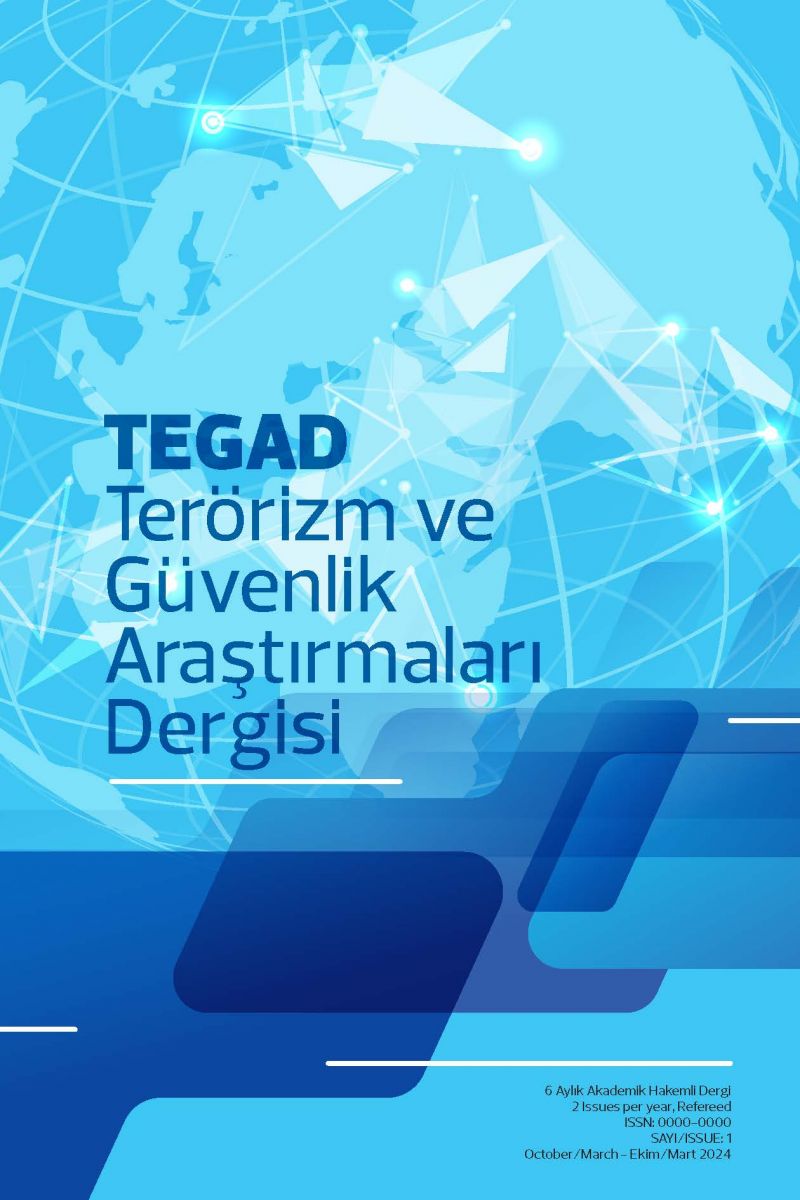Araştırma Makalesi | Açık Erişim
Terörizm ve Güvenlik Araştırmaları Dergisi 2025, Clt. 2(1) 33-45
The Unidentified Threat: Terrorism’s Impasse on National Politics and Democracy
ss. 33 - 45 | DOI: https://doi.org/10.29329/tegad.2025.1301.3
Yayın Tarihi: Mart 31, 2025 | Görüntüleme Sayısı: 169/58 | İndirilme Sayısı: 217/69
Özet
The aim of this study is to fill the gap created by the uncertainty in the definition of the concept of terrorism in political science and the international arena by examining the paradoxical relationship between the norms that shape the understanding of democracy of states and nationalism and anarchism, so it is emphasized that the limitations in the definition of this concept should be overcome with the help of constructivist theory and the issue should be addressed from broader perspectives. Terrorism’s attempts to legitimize actions aimed at directly affecting societies and restricting or eliminating state actions through political manipulations create security problems both globally and nationally. Especially in democratic systems, the fact that such separatist attitudes threaten the sustainability of peace by changing the perception of the people, creating problems such as insecurity and polarization with the potential to weaken state structures should not be ignored. Therefore, it is of critical importance for nations to strengthen their understanding of nationalism, identity norms, and to clarify the distinction between us and them. In this respect, constructivism theory’s effort to explain the concept supports all actors by reminding them that events change according to the way they occur and the conditions of the period. In addition, the theory deeply affects the social order and norms of terrorism and the paradoxical relationship between nationalism and anarchism. However, the changes brought by globalization also show that terrorism can manifest in different forms and methods, acquiring new dynamics over time.
Anahtar kelimeler: Difficulty of Defining Terrorism, Democracy, Nationalism, Anarchism, Constructivism, Identity, Security
APA 7th edition
ARAS, A. (2025). The Unidentified Threat: Terrorism’s Impasse on National Politics and Democracy. Terörizm ve Güvenlik Araştırmaları Dergisi, 2(1), 33-45. https://doi.org/10.29329/tegad.2025.1301.3
Harvard
ARAS, A. (2025). The Unidentified Threat: Terrorism’s Impasse on National Politics and Democracy. Terörizm ve Güvenlik Araştırmaları Dergisi, 2(1), pp. 33-45.
Chicago 16th edition
ARAS, Aleyna (2025). "The Unidentified Threat: Terrorism’s Impasse on National Politics and Democracy". Terörizm ve Güvenlik Araştırmaları Dergisi 2 (1):33-45. https://doi.org/10.29329/tegad.2025.1301.3
Abubaker, S. S. (2021). Terrorsim: A Conceptual Framework. International Humanities and Social Science Reviews, 5(1), 35-58.
Ayas, M. Ö., & Ünsal, Z. E. (2024). Avrupa Birliği’nde Yükselen Milliyetçilik, Göç ve Terörizm Arasındaki İlişki: Kavramsal Bir Analiz. Florya Chronicles of Political Economy, 157-185.
Bhatia, A. (2009). The Discourses of Terrorism. Journal of Pragmatics, 279-289.
Biçer, R. S. (2019). Uluslararası Çatışmaların Değişen Yapısında Terörün Yeri ve Önemi Üzerine Bir İnceleme. Savunma Bilimleri Dergisi, 110-133.
Gray, C. S. (2002, June 5). Thinking Asymmetrically in Time of Terror. Retrieved from The US Army War College Quarterly: Parameters: https://press.armywarcollege.edu/cgi/viewcontent.cgi?article=2079&context=parameters
Gutierrez, J. A., & Kinna, R. (2022). Anarchism and The National Question—Historical, Theoretical and Contemporary Perspectives. Nations and Nationalism, 121-130.
Hand, A. W., & Saiyra, N. (2023). Democracy’s Ambivalent Effect on Terrorism. Journal of Conflict Resolution, 1618-1643.
Hazır, H. (1990, June 13). Demokrasi ve Siyasi Terör. Retrieved from DergiPark: https://dergipark.org.tr/tr/download/article-file/
Jensen, R. B. (2004). Daggers, Rifles and Dynamite: Anarchist Terrorism in Nineteenth Century Europe. Terrorism and Political Violence, 116-153.
Kassel, W. (2009). Terrorism and the International Anarchist Movement of the Late Nineteenth and Early Twentieth Centuries. Studies in Conflict & Terrorism, 237-252.
Kemik, G. (2021). Discussing Terror: The Problem of Definition, General Characteristics and Analysis in Terms of International Law. Artuklu Kaime Uluslararası İktisadi ve İdari Araştırma Dergisi, 166-187.
Magen, A. (2018, January). Fighting Terrorism: The Democracy Advantage. Retrieved from Journal of Democracy: https://www.journalofdemocracy.org/articles/fighting-terrorism-the-democracy-advantage/
Meisels, T. (2009, September). Defining Terrorism – A Typology. Critical Review of International Social and Political Philosophy, 12(3), 331-351.
Piccone, T. (2017, September 5). Democracy and Terrorism. Retrieved from Brookings: https://www.brookings.edu/wp-content/uploads/2017/08/fp_20170905_democracy_terrorism.pdf
Ranstorp, M. (2009). The Contemporary Study of Political Terrorism. In R. Jackson, M. B. Smyth, & J. Gunning, Critical Terrorism Studies (pp. 1-270). New York: Routledge.
Saiya, N. (2018). Weapon of Peace: How Religious Liberty Combats Terrorism. Cambridge University Press, 1-240.
Sökücü, D. (2009). Küreselleşen Terörizmin Uluslararası Siyasete Etkisi. Retrieved from İstanbul Üniversitesi: https://nek.istanbul.edu.tr/ekos/TEZ/45789.pdf
Teichman, J. (2009, January 30). How to Define Terrorism. Retrieved from Cambridge University Press: https://www.cambridge.org/core/services/aop-cambridge-core/content/view/C1178DA4990BFA8A-2DA3DA48F6960BF0/S0031819100044260a.pdf
Weinberg, L., Pedahzur, A., & Hirsch-Hofler, S. (2010, August 10). The Challenges of Conceptualizing Terrorism. Terrorism and Political Violence, 777-794. https://www.tandfonline.com/doi/epdf/10.1080/095465590899768?needAccess=true
White, J. R. (2015). Terrorism in Historical and Social Contexts. In J. R. White, Terrorism and Homeland Security (pp. 1-24). Boston: Cengage Learning.
Whittaker, D. J. (2004). Terrorist in Groups. In D. J. Whittaker, Terrorists and Terrorism in the Contemporary World (pp. 33-48). New York: Routledge.
Yılmaz, V. (2011, June 30). Modern Demokrasilerde Terörle Mücadele ve Otoriter Yansımalar. Retrieved from Afyon Kocatepe Üniversitesi: https://acikerisim.aku.edu.tr/xmlui/bitstream/handle/11630/2606/Vedat%20YILMAZ%20YÜKSEK%20LİSANS%20TEZİ%20090642013.pdf?sequence=1&isAllowed=y
Özerkmen, N. (2004). Terör, Terörizm ve Radikal İslamcı Terör. Ankara Üniversitesi Dil ve Tarih-Coğrafya Fakültesi Dergisi, 247-265.
